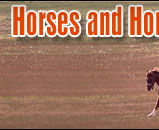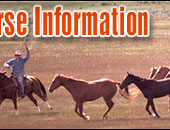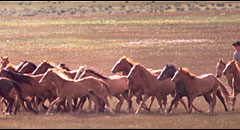 |
   |
|
|
|
You are here: Horses > Horse rescue / adoption > Equine rescue leagues |
Horse Rescue and Rehabilitation Organization are Equine Guardian Angels
Not everyone who owns a horse should. Inexperienced riders
or first-time horse owners should not own untrained horses,
for instance. Whether through ignorance or cruelty, many
horses are kept in deplorable conditions or mistreated. |
|
|
One such story occurred in Indiana, where almost forty
horses were kept on the brink of starvation in horrible
conditions. When concerned neighbors heard too many stories
about the horsesí poor condition and neglect, they decided
to act.
One woman pretended she had once stabled her horses at the
barn and asked if she could look around, and discovered the
poor, nearly skeletal animals standing in knee-deep manure
and urine. |
After the state police were notified, they asked the Animal
Kindness Organization to help them in assessing the horsesí
condition. On a Perdue scale, three of the animals rated a
deplorable minus one.
The Animal Kindness Organization was not equipped to handle
equine rescue. Usually dealing with the problem of neutering
cats and dogs, they nonetheless tried to help with the
thirty eight starving horses. Although the horses quickly
overwhelmed the organization, news coverage helped to spread
the story, and people across the area called to offer feed,
homes, and help with the horses.
In some areas, there are local organizations which
specialize in stopping horse abuse and neglect and help to
rehabilitate abused animals. Their success rates vary, as do
their goals. Some try to find adoptive homes for retired
racehorses, while others find good, relaxing homes for
elderly horses to live out their remaining years. Others try
to crack down on abuse. Almost none receive financial help
from the government, and almost all depend largely or
totally on volunteers, private donations, and fundraising.
One such example is the Days End Farm, run by Kathleen
Schwartz. Opened in 1989, she did not receive non-profit tax
status until 1991. Now she accepts horses that have been
abused or neglected, working with animal control agencies in
the area. Most of the neglect cases she sees are either
cases of starved horses, or those with severe and untreated
hoof problems. The staff at the Days End Farm helps to build
abuse cases by taking pictures.
When a horse is impounded, it is taken in by the farm and
given proper feeding, vet and farrier care, and training to
try and rehabilitate it. While most of the horses at the
Days End Farm may never be rehabilitated to the point where
they can be ridden again, they can still make excellent
companion animals for other horses.
After the rehabilitation process, the horses are put up for
adoption. The screening process is exacting. Also, the Days
End Farm only surrenders possession of the horse, not its
title. This way, if the adopter cannot keep the horse or
does not properly care for the animal, the Days End Farm can
take it back. Although the farm can occasionally accept
horses that havenít been abused but are simply no longer
wanted, it often has to turn those animals away. There are
more abuse and neglect cases than it can handle, and those
horses take precedence.
The staff at Days End believes that education is the key to
stopping horse neglect and abuse. To that end, it goes to
great lengths to teach others about the needs of horses.
They offer a Horse Loverís Badge through the local Girl
Scouts. To earn this badge, the Girl Scouts work in the barn
caring for horses, and learn through first-hand observation
of the neglected horses just what happens when they arenít
cared for properly. The Days End Farm also offers programs
for school children and works with the handicapped. They
also attend horse shows and seminars to hand out brochures
and information on horse care.
The Days End Farm organization also works with the
University of Maryland to help train animal control
personnel, some of whom have never worked with horses
before. New animal control officers can come to Days End and
learn how to put on a halter, properly lead a horse, and how
to pick up its hoof to examine it.
Another horse rescue organization is run by Debbie Frank in
Baltimore County, Maryland. Equine Rescue and
Rehabilitation, Inc. (ERRI) was formed as a non-profit
organization in response to complaints received by the
Maryland Horse Council regarding neglected and abused
horses. They assist county officials to rescue and house
horses who are being mistreated.
Unlike the Days End Farm, ERRI can only accept horses who
have the potential to be rehabilitated. They have a group of
neighboring farms which helps to take in some of the animals
that ERRI cannot accept. ERRI has high standards not only
for the horses it takes in, but for the families who adopt
them after rehabilitation.
If a person is interested in adopting a horse from ERRI,
they must first lease the animal. They are responsible for
the expense of boarding it, and ERRI staff make sure that
the potential adopter and the horse get along well. If the
boarding experience works out well, the person is allowed to
adopt the horse, although they can never sell the animal.
Everyone at ERRI, from employees to volunteers, are active
in training. They offer riding lessons to help offset the
cost of operations, and they use some of their rehabilitated
horses in educational programs for would-be owners.
Another group looks for potential abuse before it starts on
the national scale. Called the Standardbred Retirement
Foundation (SRF), it accepts horses who are unable to
continue to compete and helps to place them in homes. Like
the Days End Farm and ERRI, it does not sell the horses it
accepts, but allows carefully vetted applicants to adopt
them.
The Foundation also continues to monitor the horse until the
end of its life. It has placed retired horses in thirty two
states.
Every horse accepted by the SRF is carefully screened. A
complete history is gathered before adoption so the horse
can be placed in the best possible home. Adopters are also
put through a vigorous screening process. Many SRF horses
have found new leases on life as hunters, jumpers, endurance
and pleasure riding horses.
SRF also offers a program called Youth in Focus, which
blends the needs of its horses with the needs of challenged
or disadvantaged youths. This program teaches basic
horsemanship to these young people who might never have a
chance to interact with horses otherwise.
So how can you help equine rescue organizations?
1) Become a volunteer. Organizations generally need help all
the time, but weekday business hours tend to be the most
difficult to cover.
2) Donate. Every bit of tack, feed, or money helps.
3) Collect the proofs-of-purchase from your feed bags. Many
times, participating equine rescue organizations can receive
donations from your farm co-op by collecting these.
4) Get involved. Participate in fund-raising events like
seminars and symposiums.

|
Read the next horse rescue article on
Keeping Your Horse Safe. |
|
|
|
|
 |
|
|
|
|
|
Horse Education
|
|
|
|
|
Horse Information Topics
|
|
|
|
|
|
|
|
Horse Business Owners
|
| |
Advertise with Us
Have your horse products or services exposed to over 27,000 of our monthly visitors.
|
|
|
|
|
|